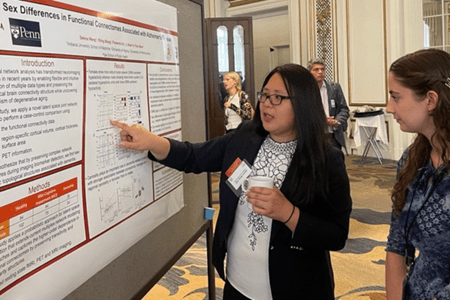2025 REC Scholar Selena Wang, PhD, is trying find the answer to many complexities of the brain and Alzheimer’s disease using Artificial Intelligence.
Advancements in Artificial Intelligence are providing new promise to the biomedical research community, and yet the often “black box” nature of modern-day AI tools leads to trust issues.
Black box AI refers to artificial intelligence that offers inputs and outputs but does not explain how the inputs led to the outputs.
Without knowing how artificial intelligence tools came to their results, how are we to trust them? That is the question Wang is trying find the answer to – along with many others about the complexity of the brain and Alzheimer’s disease.
Wang, whose passion is the development of interpretable and actionable AI technologies, is an assistant professor of biostatistics & health data science at Indiana University.
"The often-black box nature of these methods limits the applicability and trust in these systems," Wang said. “I believe that by instilling interpretable generative principles in AI model building, we can improve the interpretability of new AI technology and ultimately provide actionable insights for medical research.”
In creating and using AI tools, Wang’s research focuses on tackling the intricate data modeling challenges associated with connected structures, or networks, particularly in the context of brain connectomes.
In essence, she is working to best map and understand the complex connections (networks) in the brain, like figuring out how all the different parts of a city are linked together.
These networks, derived from neuroimaging data, reveal crucial insights into brain function.
"I model real-world networks with statistically sound principles and methods—reduce network complexity, perform intuitive visualization and test critical hypotheses with improved statistical power and controlled type I errors," Wang said.
REC Scholar Award Impact
Wang was recently named a 2025 Research Education Component (REC) Core Scholar. The award, given annually to three new Principal Investigators, is a $10,000 award over one year to use toward research, conference attendance and publication costs for early-stage faculty investigators who are investigating AD-ADRD topics.
“Being a REC scholar awardee will help my future research as it provides me with resources to advance methodology research for Alzheimer’s disease,” Wang said.
She is also a 2025 William H. Gates Sr. Fellow.
Groundbreaking Research Presented at Spring ADRC Meeting
Dr. Selena Wang's recent work has earned her a spot at the 2025 Spring ADRC Meeting in San Francisco, where she will present her poster, "Sex differences in functional connectomes associated with Alzheimer’s disease."
This project delves into the sex-specific topological structures associated with typical Alzheimer's dementia using a cutting-edge interpretable latent space estimation technique.
"We found sex differences in network topology with females showing more default mode network (DMN)-centered hyperactivity whereas males showing more limbic system (LS)-centered hyperactivity while both show DMN-centered hypoactivity," Wang said. "We find that centrality plays an important role in dementia-related dysfunction with stronger association between connectivity changes and regional centrality in females than in males."
Wang says the opportunity helps meet her goal of sharing findings with the public.
“This opportunity to attend the spring meeting aligns with my goal to engage in public dissemination of our findings, calling on new policy changes that support ADRD research providing equal access to women.”
Beyond the Lab
Outside of their research, Wang finds solace and joy in hiking and exploring the outdoors. This passion began in 2016 with their Olde English Bulldog, Bernie.
"When Bernie was younger, he could not stay still; so my husband (boyfriend at the time) and I went out walking/hiking with him every day," Wang said.
She says Bernie now prefers the comfort of the couch, but she and her husband’s love for hiking remains strong.
